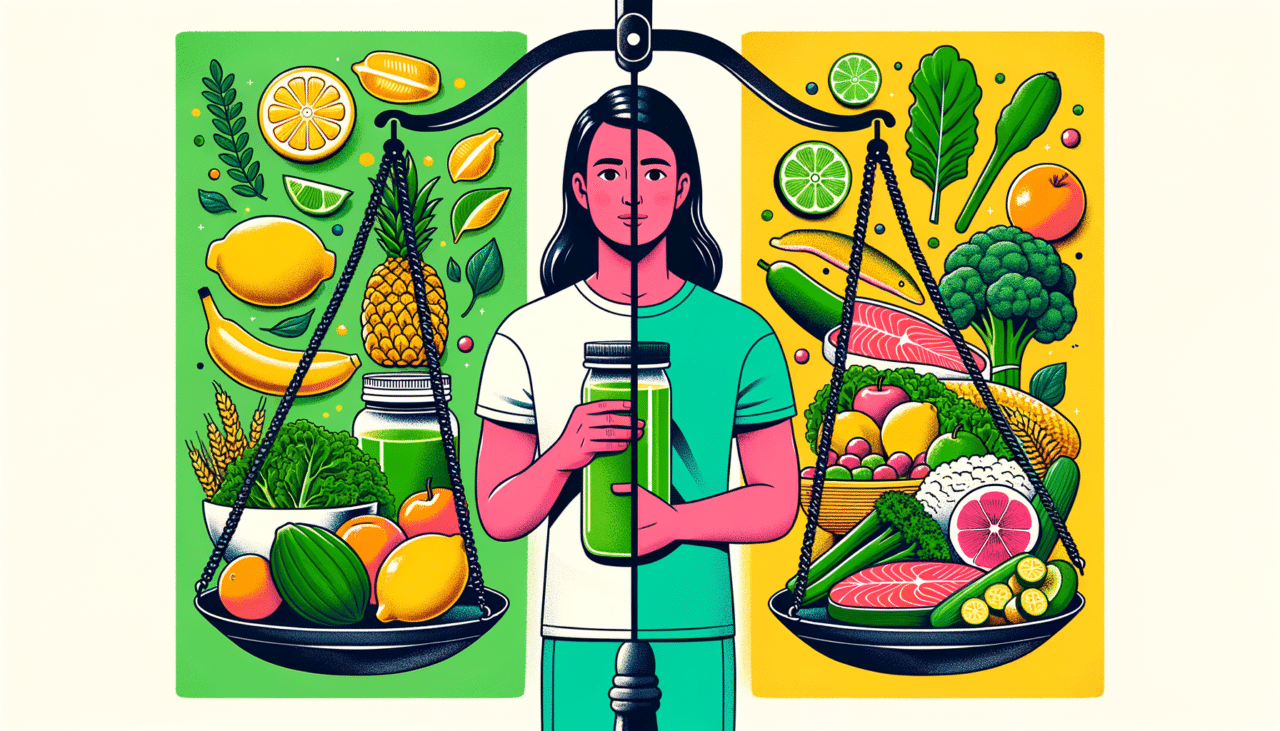In the world of nutrition and health, the debate between detox diets and balanced diets is ongoing. Both have their advocates and critics, and both offer unique benefits and challenges. Whether you’re looking to shed a few pounds, improve your overall health, or simply understand more about these dietary approaches, this article will provide a detailed comparison. Our goal is to help you make an informed decision by providing a clear analysis of each diet type and their main characteristics.
What is a Detox Diet?
A detox diet is a nutritional plan designed to eliminate toxins from the body. These diets often involve fasting, followed by a strict diet of fruits, vegetables, fruit juices, and water. The idea is to cleanse the body and improve health by removing impurities. Detox diets can vary significantly but are typically short-term interventions.
Characteristics of Detox Diets:
- Focus on Cleansing: Primarily aimed at removing toxins from the body.
- Short-term: Usually lasts for a few days to a week.
- Restricted Food Choices: Limited to specific foods such as fruits, vegetables, and juices.
- Rapid Weight Loss: Often results in quick weight loss, mainly water weight.
- Potential Side Effects: May include fatigue, headaches, and irritability due to restricted calorie intake.
What is a Balanced Diet?
A balanced diet, on the other hand, emphasizes the consumption of a wide variety of foods in appropriate proportions. It includes all the necessary nutrients required for the body to function optimally. The goal is to maintain a healthy weight, provide energy, and prevent chronic diseases.
Characteristics of Balanced Diets:
- Nutritional Variety: Incorporates all food groups, including proteins, carbohydrates, fats, vitamins, and minerals.
- Long-term Sustainability: Designed to be a lifelong eating plan.
- Portion Control: Focuses on appropriate serving sizes for all food types.
- Prevention of Nutrient Deficiency: Ensures adequate intake of essential nutrients.
- Overall Health Improvement: Supports overall well-being and disease prevention.
Comparative Table: Detox Diet vs. Balanced Diet
| Feature | Detox Diet | Balanced Diet |
|---|---|---|
| Purpose | Remove toxins from the body | Provide complete nutrition |
| Duration | Short-term (days to a week) | Long-term (lifetime) |
| Food Variety | Limited (fruits, vegetables, juices) | Diverse (all food groups) |
| Weight Loss | Rapid, primarily water weight | Gradual, sustainable |
| Nutrient Intake | May lack essential nutrients | Comprehensive nutrient profile |
| Ease of Following | Can be challenging due to restrictions | More flexible and adaptable |
| Potential Side Effects | Possible fatigue, headaches | Minimal if balanced correctly |
| Sustainability | Not sustainable long-term | Highly sustainable |
Conclusion
Choosing between a detox diet and a balanced diet depends on your personal health goals and lifestyle preferences. Detox diets can offer a quick way to jumpstart weight loss and improve short-term health, but they may not provide the necessary nutrients for long-term health. On the other hand, balanced diets are more sustainable, offering a comprehensive approach to nutrition that supports lifelong health and wellness.
For those seeking a quick cleanse, a detox diet might be suitable, but it’s crucial to be aware of its limitations and potential side effects. If your goal is to maintain health and prevent disease in the long run, adopting a balanced diet is likely the more beneficial approach.
Ultimately, the best choice is one that aligns with your health goals, lifestyle, and dietary preferences. Always consider consulting with a healthcare professional or a registered dietitian before making significant changes to your diet. By understanding the differences and characteristics of detox and balanced diets, you can make an informed choice that supports your health and well-being.

Comments (0)
There are no comments here yet, you can be the first!